Strategic Strengths
The Water Community at USask is comprised of exceptional researchers and a commitment to bridging research, policy, and practice through rich, robust partnerships, braided knowledge systems, and co-created research. Through research, observatories, analytical capabilities, community engagement and partnership, and development of tools, models, and technologies, we have demonstrated strengths in the following areas, particularly as they relate to prairie, mountain, and cold region water resources:
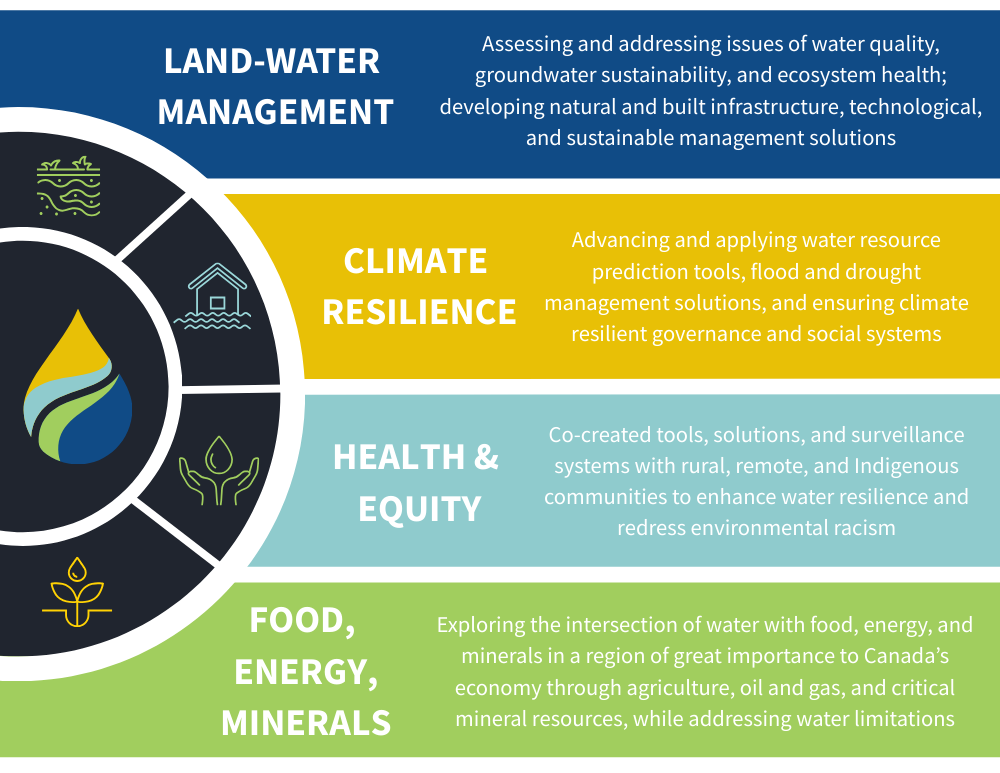
1. Land-Water Management
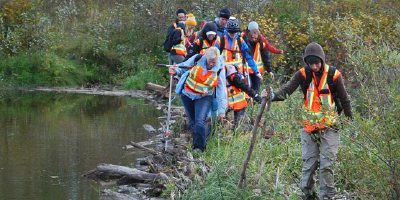
Assessing and addressing issues of water quality, groundwater sustainability, and ecosystem health and developing natural and built infrastructure, technological, and sustainable management solutions.
- water quality, developing tools, technologies, locally-informed mitigation and adaptation science, ecosystem services valuation, as the evidence-base for policies, regulations, and water quality management
- groundwater sustainability, understanding changing ground water quality and quantity, linkages to surface water, and assessing threats and management strategies
- agriculture and forest hydrology, models, in situ monitoring, and process understanding at different scales for better management and investment
- natural and built infrastructure and technologies, developing innovative climate-resilient designs, treatment technologies, and nature-based solutions for water-related challenges
- water resources, source water protection, and watershed planning, conservation and restoration of aquatic habitats and wetlands, ecohydrology, governance and management across knowledge systems
2.Climate Resilience: Climate and Water Resilient Communities, Sectors, and Ecosystems
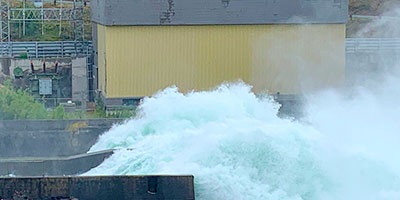
Advancing and applying water resource prediction tools, flood and drought management solutions, and ensuring climate resilient governance and social systems.
- water resources prediction and forecasting, leveraging cutting-edge remote sensing and modeling techniques for predicting extremes of global change and emerging threats to human health, critical infrastructure, and ecosystem health
- environmental, ecosystem, and human health assessments, eDNA, hi-tech analytics, field observatories, community participatory research, and advances in interdisciplinary and transdisciplinary assessments to support adaptation design and dismantling of systemic inequities
- flood and drought management, developing tools and assessing alternate management and adaptation strategies to better cope with uncertainties and extremes
- adaptive water governance and social systems, towards resilient communities and sectors by conducting economic analyses, assessing insurance and other risk reduction strategies, harnessing and advancing coupled human-water system approaches
3. Water, Health, and Equity
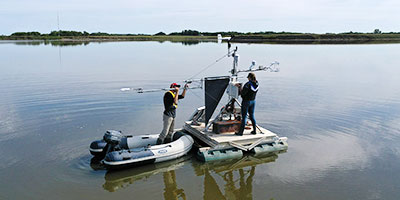
Empowering rural, remote, and Indigenous communities through co-created tools, solutions, and surveillance systems to enhance water resilience and redress environmental racism.
- vulnerability and resilience tools and assessments, quantification of direct and indirect health threats as a result of changing climate and understanding of differential vulnerabilities between and within population groups
- co-governance approaches, bridging Indigenous and non-Indigenous legal and knowledge systems for sustainable and equitable access to and management of water resources across political, spatial, and temporal scales
- local water security, comprehensive understanding of water demand drivers and patterns, future resource constraints and threats, and differential impacts and vulnerabilities, as well as existing social and ecosystem-driven resilience
4. Water Interactions: Food, Energy, Minerals
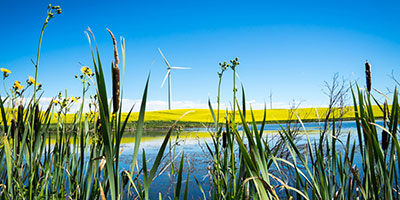
Exploring the intersection of water with food, energy, and minerals in a region that is of great importance to Canada’s economy through agriculture, oil and gas, and critical mineral resources, while also addressing water limitations.
- soil, water, plant continuum, developing models of water and nutrient uptake and exports by different crops, root zone moisture processes, and agricultural water management
- chemical and nutrient use and runoff and infiltration for water quality, understanding social and environmental drivers of land applications, barriers and facilitators to improved chemical and nutrient application and management, and chemical and nutrient uptake and storage under current and future climates
- water infrastructure management, innovative design and adaptive management of built and natural infrastructure used for supply augmentation (food and drinking water security), flood and drought mitigation, energy generation, and water quality
- managing mineral extraction for water quality for ecosystem and human health, integrating geochemistry, advanced imaging, and novel sensor development with advanced modeling, ecosystem toxicology, and societal impacts, to assess and predict risk
Signature Areas of Research

Water
As the world's population continues to grow, water becomes an increasing topic of political and social importance. We are conducting research that addresses land-water management, builds climate and water resilient communities and sectors, and explores the relationships between water and food, and water and energy.
